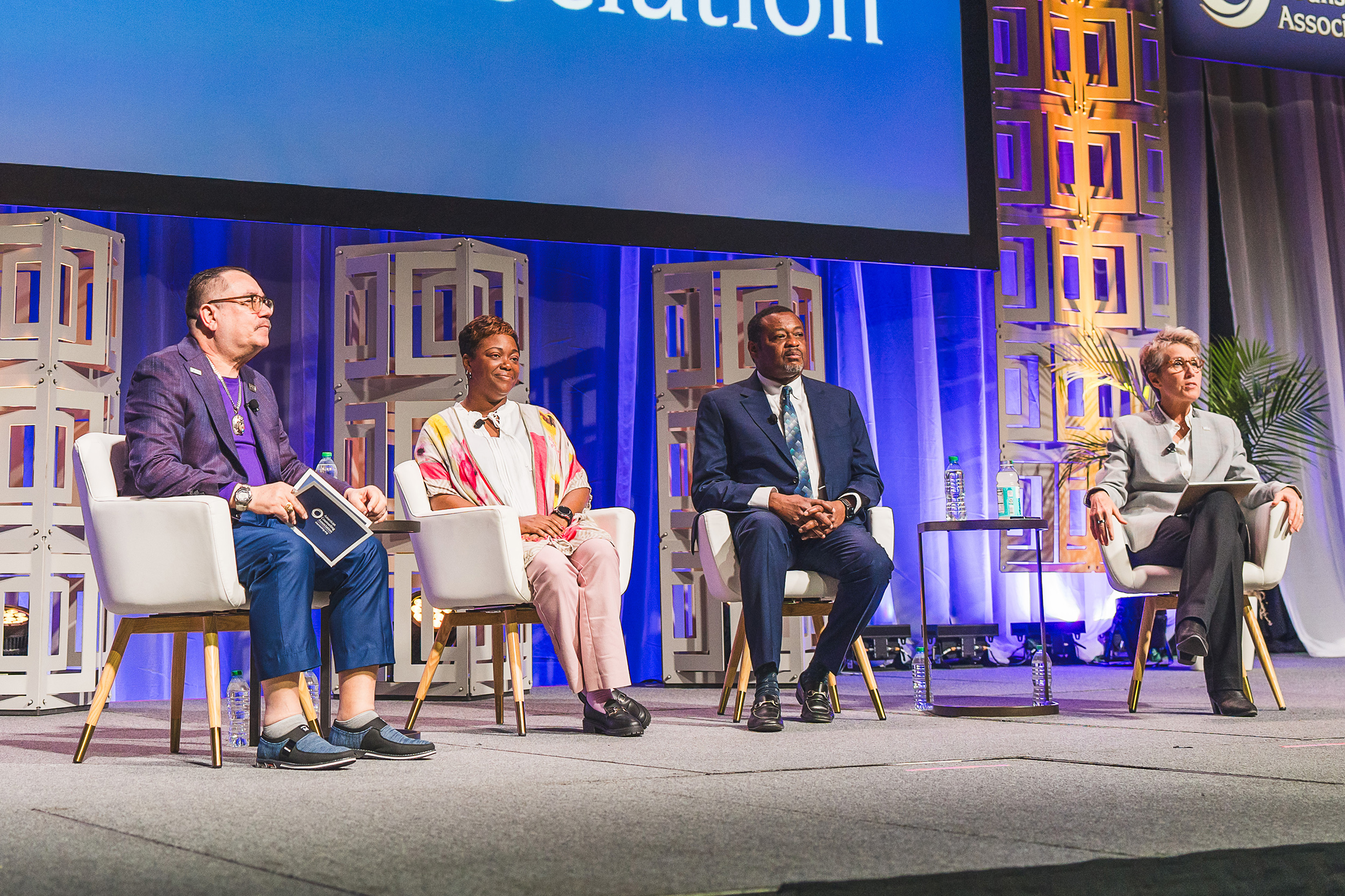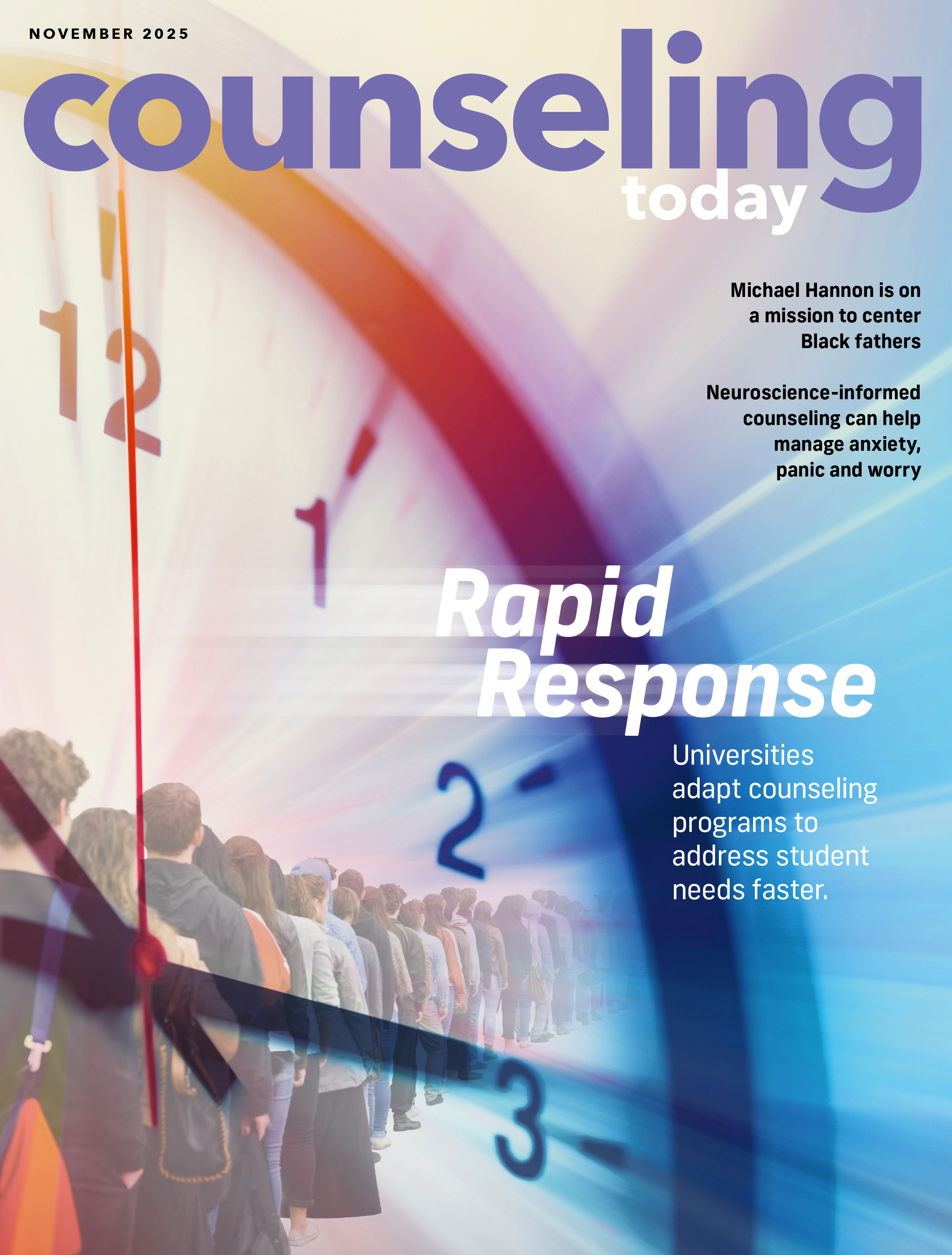Closing Keynote Paves Way for Radical Collaboration
April 2024

ACA Conference attendees quietly gathered early Saturday morning for a closing keynote panel that featured three leaders in the mental health field committed to supporting the mental health of marginalized populations. But the room quickly filled with cheers and applause as Jewell Gooding, executive director of Silence the Shame and a national certified counselor, shared how her own burnout as a counselor led her to realize the gaps in mental health care systems. This experience led her to find ways outside of the clinical space to address these gaps.
“It’s not just about therapy. There’s so much more that we can do to educate our communities,” Gooding told an energized crowd. “We are bringing people together ... to understand and educate and figure out how to live mentally well.”
During the closing keynote, which was moderated by ACA President Edil Torres Rivera, PhD, LPC, LCPC, Arthur Evans Jr., PhD, CEO and Executive Vice President of the American Psychological Association, and Schroeder Stribling, President and CEO of Mental Health America, joined Gooding in calling for collaboration between mental health professionals on anti-racism efforts, population health and outreach to underserved communities.
The Need for Change
After the death of George Floyd, APA realized they needed to do more to address racism and inequality. “Even though our organization had been making these commitments to issues of diversity, equity and inclusion, we also had history where we were working against those ideas and those values,” Evans told the audience.
To rectify this, APA first issued an apology to communities of color and then did their own research to identify how the field had contributed to the inequities of society. They have also made a long-term commitment to take actions that address these inequalities. For example, Evans shared how they are rethinking the content they publish in their journals to ensure they are only promoting ideas that align with what they value as a field.
“We’re not doing these things simply because there are the ‘right thing to do.’ We’re doing them because we believe they will make our field stronger,” he said.
Working Together to Improve Mental Health
Stribling called for counselors to engage in “radical collaboration” to address the mental health issues in our communities. Every mental health specialty, organization, mission and professional brings something unique and important to the discussion, she noted. In particular, she said she appreciated how counselors bring the “soul and spirit” to the conversation.
Evans shared how this collaborative process has already begun with an alliance between CEOs of different mental health organizations. These professionals are working together to adopt a similar vision of mental health and help make a difference together in marginalized communities.
He also stressed the need for mental health organizations and providers to support each other. “I want you to know that APA wants to be your partner,” Evans said. “Psychology and counseling have had a very long history together. And given the issues that we see before us in this nation and around the world, now is the time for us to be working together.”
He admitted this collaboration doesn’t mean mental health professionals will always agree with each other. “For all the areas of mental health, we agree on probably 95%-98% of the things,” Evans said. “So the issue is how do we not allow the 2% or 3% to get in the way of us working together on the things that we really believe.”
Stribling told the audience that this collaboration must be purposeful to ensure that we are not still creating systems that are oppressive or damaging. And all three panelists agreed that this requires mental health professionals to adopt a health- and wellness-oriented mindset rather than a pathologizing one.
Gooding told the audience how her organization Silence the Shame was formed with the goal of eliminating mental health stigma and reducing health disparities by empowering and educating communities on mental health. And their work is informed by the knowledge that Black and marginalized communities are overlooked, underserved and often ignored, she added.
Silence the Shame hosts activities and programs that engage communities with the aim to normalize conversations about mental health and promote mental wellness for vulnerable and disparate population groups.
Mental Health America also has several initiatives that promote public health. For example, the organization started a free online screening tool for mental health about 12 years ago, and now they are mapping the data from this screening tool to find “hot spots” of need, Stribling told the audience. By doing this, they have noticed that places with anti-LGBTQ+ legislation are also areas where people who identify as trans are screening themselves for some form of depression, suicidal ideation, anxiety, despair and other mental health issues, she noted.
Recognize Your Power
“We have to really realize the power that we hold in our hands in the work that we do,” Stribling told the audience. She emphasized this point by sharing her own personal story of coming out to her parents in the late 1980s. After she told her parents, her stepfather went to the library and looked up “homosexuality” in the Diagnostic and Statistical Manual of Mental Disorders. He then told Stribling, “They say it’s not a problem, so I don’t see an issue.” But this could have been a different story, Stribling pointed out, if her stepfather had referenced an earlier edition of the DSM where homosexuality was pathologized.
Gooding also stressed the important role counselors play in shaping policies and practices around mental health issues. “You are the people who have voice. You are the constituents that can make the change. The organizations can only do so much,” she told the audience.
She encouraged counselors to ask themselves, “How can I contribute? How can I have a voice in this? What is my space in this?” Then, they can advocate for themselves and the communities they serve.
And she reminded the audience that change often starts with their local communities. “Most of the time, you get more things done in smaller communities than you will ever get accomplished in the government and in these bigger organizations,” she said.
Reaching Out to Marginalized Communities
Before joining APA, Evans spent several years in the public sector, and this experience showed him that people who need mental health services are often not the ones who seek treatment. Mental health professionals can’t expect people to come to them, he told the audience. Instead, he challenged the attendees to get creative and think outside of the box and find ways to connect and engage with their communities.
For example, when Evans was commissioner of Philadelphia’s Department of Behavioral Health and Intellectual disAbility Services, he helped launch an initiative aimed at getting men of color to talk more openly about mental health. Rather than waiting for these men to go to therapy, they brought the conversation to them with storytelling events. Evans told the audience he thought they would only get about 12 people to come to the first event and was shocked when they filled the room to capacity with 300 people. And that number kept increasing with each event they held.
“We changed the paradigm,” Evans said. “We didn’t ask the community to come to us; we went to the community and engaged the community on its own terms. That opened up a whole way of people talking about the issue and seeing that issue in a very different way.”
Stribling and Evans advised the audience to build programs around what communities need. People and communities know their own challenges, so what counselors need to do is bring their own expertise and stand beside and support the individuals in the communities, Evans said.
The Time Is Now
Gooding again received applause from the audience when she stressed that mental health shouldn’t be a trending topic but instead a normal part of how we choose to live our lives. “There is no us and them; it’s just us,” she said. “Not all of us have mental illness but all of us have mental health.”
She also challenged the attendees to pay attention to what is happening politically and make a conscious effort to go into those spaces and fight.
“A large part of the population [and] decision makers are paying attention to what we do,” Evans said. “And we have to do everything we can in this window of opportunity to reshape what we have done historically to make sure that we’re reaching everyone in our community.”
Search CT Articles
Current Issue
Sign Up for Updates
Keep up to date on the latest in counseling practice. Sign up to receive email updates from Counseling Today.


